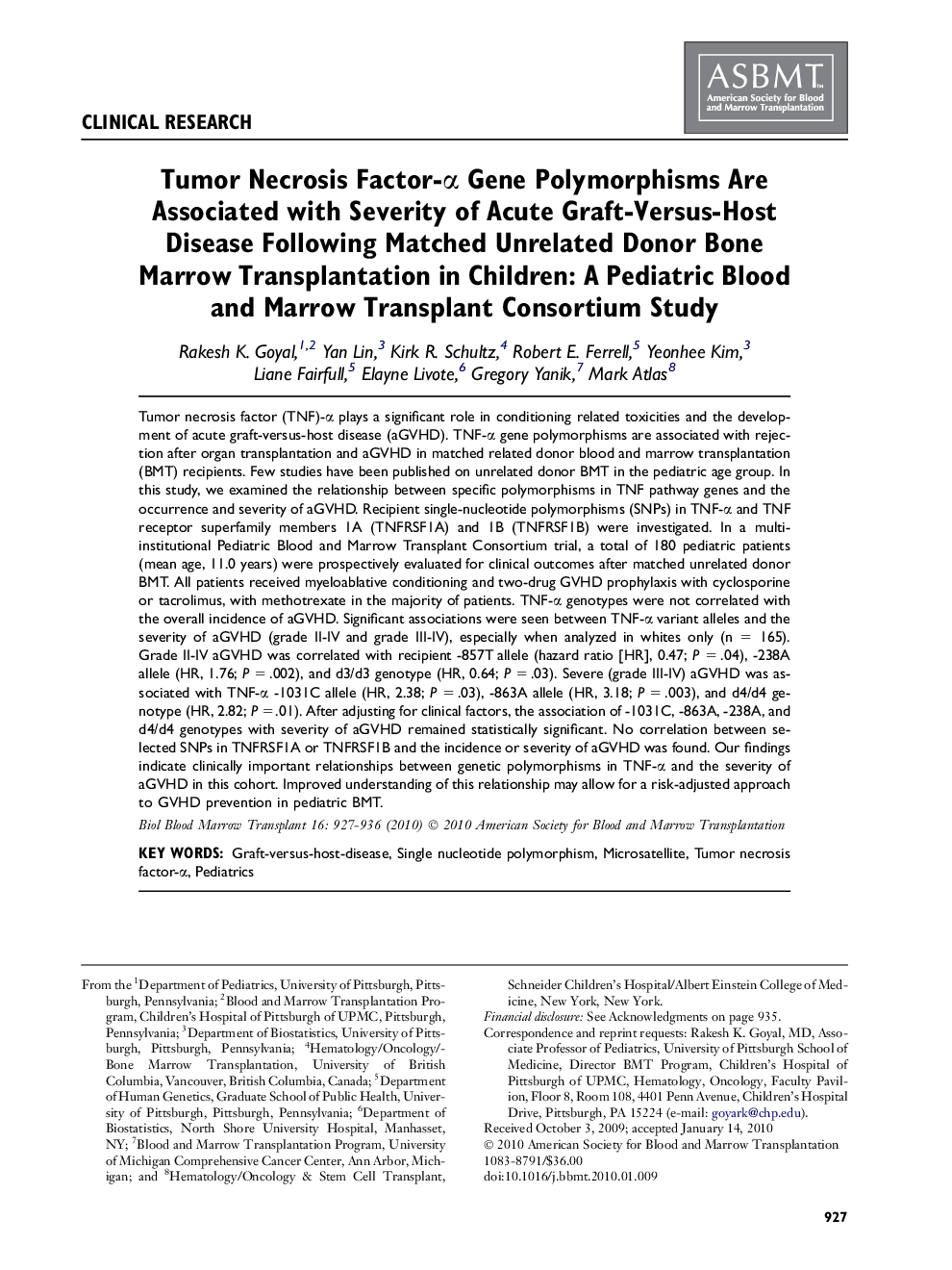| کد مقاله | کد نشریه | سال انتشار | مقاله انگلیسی | نسخه تمام متن |
|---|---|---|---|---|
| 2104225 | 1546333 | 2010 | 11 صفحه PDF | دانلود رایگان |
عنوان انگلیسی مقاله ISI
Tumor Necrosis Factor-α Gene Polymorphisms Are Associated with Severity of Acute Graft-Versus-Host Disease Following Matched Unrelated Donor Bone Marrow Transplantation in Children: A Pediatric Blood and Marrow Transplant Consortium Study
دانلود مقاله + سفارش ترجمه
دانلود مقاله ISI انگلیسی
رایگان برای ایرانیان
کلمات کلیدی
موضوعات مرتبط
علوم زیستی و بیوفناوری
بیوشیمی، ژنتیک و زیست شناسی مولکولی
تحقیقات سرطان
پیش نمایش صفحه اول مقاله

چکیده انگلیسی
Tumor necrosis factor (TNF)-α plays a significant role in conditioning related toxicities and the development of acute graft-versus-host disease (aGVHD). TNF-α gene polymorphisms are associated with rejection after organ transplantation and aGVHD in matched related donor blood and marrow transplantation (BMT) recipients. Few studies have been published on unrelated donor BMT in the pediatric age group. In this study, we examined the relationship between specific polymorphisms in TNF pathway genes and the occurrence and severity of aGVHD. Recipient single-nucleotide polymorphisms (SNPs) in TNF-α and TNF receptor superfamily members 1A (TNFRSF1A) and 1B (TNFRSF1B) were investigated. In a multi-institutional Pediatric Blood and Marrow Transplant Consortium trial, a total of 180 pediatric patients (mean age, 11.0 years) were prospectively evaluated for clinical outcomes after matched unrelated donor BMT. All patients received myeloablative conditioning and two-drug GVHD prophylaxis with cyclosporine or tacrolimus, with methotrexate in the majority of patients. TNF-α genotypes were not correlated with the overall incidence of aGVHD. Significant associations were seen between TNF-α variant alleles and the severity of aGVHD (grade II-IV and grade III-IV), especially when analyzed in whites only (n = 165). Grade II-IV aGVHD was correlated with recipient -857T allele (hazard ratio [HR], 0.47; P = .04), -238A allele (HR, 1.76; P = .002), and d3/d3 genotype (HR, 0.64; P = .03). Severe (grade III-IV) aGVHD was associated with TNF-α -1031C allele (HR, 2.38; P = .03), -863A allele (HR, 3.18; P = .003), and d4/d4 genotype (HR, 2.82; P = .01). After adjusting for clinical factors, the association of -1031C, -863A, -238A, and d4/d4 genotypes with severity of aGVHD remained statistically significant. No correlation between selected SNPs in TNFRSF1A or TNFRSF1B and the incidence or severity of aGVHD was found. Our findings indicate clinically important relationships between genetic polymorphisms in TNF-α and the severity of aGVHD in this cohort. Improved understanding of this relationship may allow for a risk-adjusted approach to GVHD prevention in pediatric BMT.
ناشر
Database: Elsevier - ScienceDirect (ساینس دایرکت)
Journal: Biology of Blood and Marrow Transplantation - Volume 16, Issue 7, July 2010, Pages 927-936.e1
Journal: Biology of Blood and Marrow Transplantation - Volume 16, Issue 7, July 2010, Pages 927-936.e1
نویسندگان
Rakesh K. Goyal, Yan Lin, Kirk R. Schultz, Robert E. Ferrell, Yeonhee Kim, Liane Fairfull, Elayne Livote, Gregory Yanik, Mark Atlas,